N E X U S
symphonic progressive rock music with allusions to ELP, Yes and Genesis
album reviews and additional artist reflections
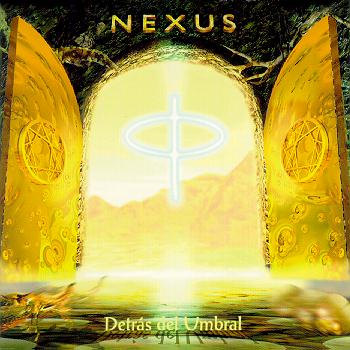
Image © 1998-1999 Record Runner
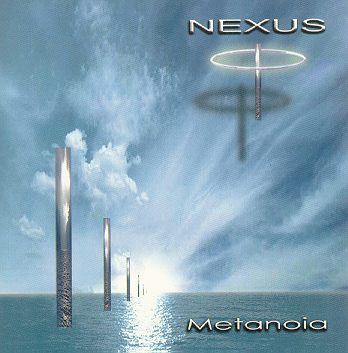
Image © 2001 Record Runner
click on album covers to visit the NEXUS website
Review, Photographs and HTML © Russell W Elliot 2000
All photographs taken at NEARfest 2000
Formatted for 800 x 600 or larger windows
Last review: 11 November 2001 | Last update: 27 April 2003
The live album by Pär Lindh Project was reviewed here earlier this year. At that time NEARfest organizer Rob LaDuca, knowing of Musical Discoveries' interest in progressive music fronted by female vocalists, recommended we consider attending this year's festival not only to see PLP, but Nexus, a band from Argentina fronted by a stunning vocalist named Mariela González. Further exploration on the web led us to the band's website.
We made initial contact with Nexus keyboard player Lalo Huber in early 2000. Based on mutual interest in each others' work, a review of their debut (live) album Detrás del Umbral (Record Runner (Argentina) RR-0220, 1999) was planned. E-mail was exchanged for months and, as a result of the band's busy touring schedule, our copy of the album disc wasn't obtained until the first day of NEARfest 2000. We were fortunate to hear most of it once through in the car prior to their performance at the beginning of the second full day.
 Mariela González (Lead Vocals) Image © R W Elliot 2000 Musical Discoveries |
NEARfest 2000. When exchanging views on Echolyn's performance with other progressive music enthusiasts at the bar at the Crocodile Rock Café (Allentown, PA) following their Friday evening performance, we overheard a conversation in Spanish nearby. Our ears perked up when we heard someone say, "Lalo ..." It took us less than a nanosecond to enquire if the entourage was from Nexus; indeed they were! Lalo was right around the corner and, following introductions, we began to talk about NEARfest, their trip to the USA and the forthcoming NEXUS performance: their American debut.
NEARfest (the Northeast Art Rock Festival) 2000 was the second in the series of festivals organised by Rob LaDuca (President and co-founder) and Chad Hutchinson (Vice President and co-founder). Last year's event involved 600 attendees; this year's soldout to 1000 in about two weeks! Superb in almost every respect, it was comprised of a two-band performance at Crocodile Rock Café (Allentown, PA USA) on Friday 16 June 2000 and two five-band performances at Baker Hall, Zoellner Arts Center (Lehigh University, Bethlehem, PA USA) on 17 and 18 June 2000. Audience members were treated to performances from most corners of the globe including bands: Anekdoten, Pär Lindh Project, Illuvitar, Il Balletto Di Bronzo, D.F.A., Thinking Plague, NorthStar, Nexus, Echolyn and Priam fronting headliners Happy The Man and Transatlantic.
Zoellner Arts Center is a fantastic concert hall, far surpassing the Friday night club venue, and is perfectly suited and purpose built for live music. Aside from a few technical difficulties with the PA, the program was technically flawless. Music spanned a vast range of progressive variations including song-based progressive rock, symphonic, avante garde and rock-in-opposition. Highlights from NEARfest certainly included PLP, Nexus, Happy The Man and Transatlantic.
 Lalo Huber (Keyboards) Image © R W Elliot 2000 Musical Discoveries |
We had the opportunity to talk to Lalo, Mariela and others from the band in the margins surrounding their performance. The band remained accessible to NEARfest audience members during most of the breaks between the bands' performances. The audience's positive reaction to Nexus' performance was evident in wild applause between tracks and following their set and sales of hundreds of copies of their album. Huge queues of eager enthusiasts formed to have their albums inscribed by the band members and / or their photos taken with Mariela and others from the lineup.
Mariela is a classically trained professional vocalist. She spoke to us through an interpreter, but understood our English perfectly. "I really like the rocking sound of bands like Deep Purple and Rush. I'm a big fan David Coverdale and Genesis as well." Obviously influenced by a broad range of other artists' music, we asked about her training and she told us, "I studied for ten years and have been performing with Nexus for another ten." She is a huge Renaissance and Annie Haslam fan and smiled profuesly when she saw a Renaissance t-shirt on someone from the audience. She remarked, "Annie Haslam is the top woman of progressive rock." With a big smile on his face, Nexus' manager remarked about elements of the physical similarity between the two women.
 Mariela González Image © R W Elliot 2000 Musical Discoveries |
We asked Lalo about the band's live performances. He told us, "This is our debut performance in the United States. We played in Mexico at Baja Prog and will play at MexProg in Mexico City next week." With the positive audience reaction to their NEARfest performance, we believe that they'll be back to the United States soon.
The band's stage act varies between vast instrumental excursions during symphonic episodes similar to the style of ELP and blends it with latter day Deep Purple. The song-based portions feature Mariela's lead vocals. With a mezzo range, she is a highly theatrical performer with a polished routine. While we were reminded of Annie Haslam's stage act with Renaissance at times during her performance, Mariela has developed a dynamic and theatrical performance style that we've seen in Tracy Hitchings' shows with Landmarq (review) and recently by Karnataka's stunning Rachel Jones (review). It is actually unlikely that Mariela had seen a Renaissance performance so the similarity would at best be a coincidence. Similarities to David Coverdale's stage performance were also noted by the audience.
Mariela uses her stunning physical appearance to enhance the mood of the music swaying her body in the slow spots and rocking when the music called for it using her long flowing reddish-brown hair and resulting sensuality to great effect. A change in costume midway through the performance presented two different looks to the audience. Mariela's Genesis influence was evident when she returned to the stage following an extensitve instrumental with her face covered by a mask, very much in a Peter Gabriel style, to conclude the vocal portion of one of the band's tracks.
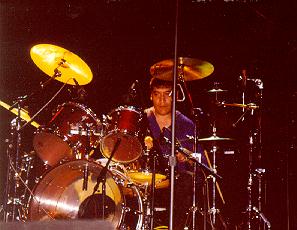 Luis Nakamura (Drums) Image © R W Elliot 2000 / Musical Discoveries |
Mariela sang almost exclusively in Spanish and left the stage during the instrumental pieces. One new track had English portions. She is the focal point for the tracks with lyrical parts which often include deeply spiritual messages. In fact, Lalo mentioned that the band's new album entitled Metanoia is due out in late 2000; translated into English, it means Redemption. Mariela's vocal work is very powerful and, despite the heavy orchestrally rich instrumental arrangements, we were impressed by the mix which put her right out in front where we could hear every word. Mariela sings in a similar vocal style to soprano Emilia Derkowska (Quidam) (review) but in the mezzo range; she is a consummate stage performer and an incredible singer.
Lalo's keyboard playing is very much in the Keith Emerson style and we were reminded of ELP in many of the instrumental riffs. We heard other portions that were equally Rick Wakeman where Yes-like melodies shone through. Daniel's bass parts were dynamically played and his stage craft was somehwat similar Chris Squire (Yes) and Jon Camp (Renaissance). Guitar parts played by Carlos in his own style were dynamic and the sound was exceptional. We especially enjoyed the interplay between the artists on-stage. Several touching moments involved Mariela's close interaction with Carlos or Daniel as well as the jamming instrumental bridges where Carlos and Daniel played off each others' energy. Carlos' playing at times is somewhat reminiscent of Steve Hackett and also exhibits influences of various rock guitarists. Luis' percussion was crisp and loud, effectively driving the music forward in each of the tracks performed live.
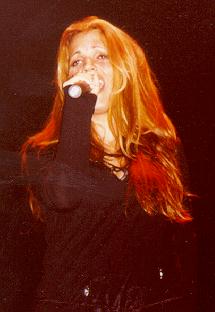 Mariela González Image © R W Elliot 2000 Musical Discoveries |
Nexus' on-stage live performance can best be summarised as having two distinct portions. The instrumental numbers are performed dynamically and technically superb. The band is extremely tight, working well as a cohesive whole. Music is rich, orchestral and symphonic with strong allusions to ELP, Yes and Genesis, and will appeal to enthusiasts of these bands' recordings as well as Renaissance.
A Renaissance allusion is visually apparent in those tracks where Mariela performs lead vocal parts. These are different but equally enjoyable and are more accessible drawing on her rock preferences. The song-based style is supported by lovely instrumental arrangements. Mariela's stage performance is dramatic, making contact with the audience with her swaying body and long hair, interacting with the guitar players, and using dance and evocative facial expression and arm motions in a theatrical style delivery.
Nexus should be seen to be adequately appreciated and we believe it was one of the high spots at NEARfest 2000. Additional images from the show are available in the webcam section of the NEARfest 2000 website. Based on reactions from the audience immediately afterwards, in the margins during rest of the day and on rec.music.progressive afterwards, know we're not alone in believing so. The band is definitely worth a long distance journey—a must see!
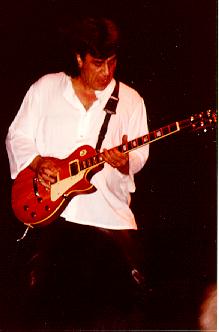 Carlos Lucena (Guitars) Image © R W Elliot 2000 Musical Discoveries |
Detrás del Umbral. Although Nexus have been playing together for an extended period, they have only recently released their album Detrás del Umbral (Behind The Gate) (Record Runner (Argentina) RR-0220, 1999). Recorded during performances from March to September 1998, the almost 74-minute album is comprised of thirteen individual tracks with two epics running over 10 minutes and several other lengthly progressive numbers. Tracks have been blended neatly from one into the next and vary from those including vocal elements to pure instrumentals.
The album opens with a brief atmospheric and symphonic introduction. A similar or perhaps even identical track was used as Nexus took the stage at NEARfest. A vast range of keyboard sounds and effects add to the mystery. A lengthy progressive, vocally strong, track entitled "Condenados" (Condemned) is the first to introduce the listener to the instrumental prowess of Nexus and Mariela's stunning vocal work. One is quickly drawn to harmony interplay of guitar and keyboard and powerful percussion. Melody, harmony and rhythm are immediately apparent in the well-structured song. Vocals are mixed way up and those that understand Spanish will be able to understand every word theatrically delivered by Mariela. A rock song of broad progressive proportions, it actualy has a relatively straight forward verse, chorus, bridge structure and is a wonderful introduction to the band's sound.
The brief "Más Allá del Limite" (Beyond The Limit) is a progressive keyboard-centric instrumental, reminscent of ELP's "Tarkus" in many ways. Soaring synthesizer excursions are balanced by guitar chords in spots and vice versa in others.
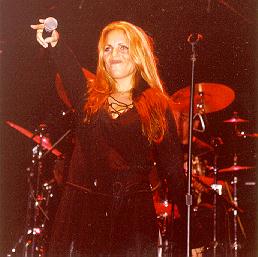
|
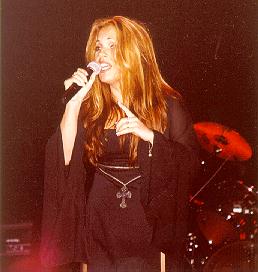
|
|
Mariela González Images © R W Elliot 2000 / Musical Discoveries |
|
"Tiempo sin Razón" (Age Of Unreason) picks up the pace with a refreshing keyboard romp that precedes a driving guitar part and a lovely, theatrically sung, lead vocal passage. Interplay between lead guitar and bass guitar are complimented by lush keyboards and driving percussion. A blend of ELP and Yes sounds is apparent during the instrumental bridges.
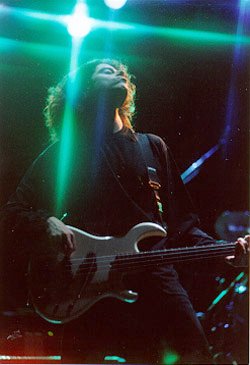 Daniel Ianniruberto (Bass) Image © NEARfest 2000 |
With their blend of lead guitar melody and lush keyboard arrangements, "Utopia" and "La Espiral" (The Spiral) are two of the album's briefest instrumentals that appear to have been structured to work as a matched pair. The driving keyboard part in the latter is very "Tarkus"-oriented but the melodic harmonies balance the ELP texture with Yes.
We were impressed with the prominence of Mariela's vocals in the multi-movement progressive epic entitled "Signos en el Cielo" (Symbols in the Sky). Musical themes established on keyboard and guitar intertwine as the driving rhythm builds and the tightness of the band becomes apparent in the opening passage. Symphonic keys eventually give way to further mystery and atmosphere that precedes the dynamically performed searching vocal part. An extensive instrumental concludes the song. Driven by keys and complimented by guitar, bass and rhythmic percussion, earlier developed themes return and blend into a soaring keyboard crescendo that concludes the track.
The track "Sueño Infinito" (Endless Dream) seemlessly picks up where "Signos en el Cielo" concludes. Much slower and sung as a ballad, the track is carried by Mariela's lead vocal part with instruments providing only a thematic backdrop initially. As the emotions within the lyrics build, instrumentals follow suit with guitar and keyboard searching, continuing the melody established initially by the lead vocal. Mariela's vocal delivery is especially notable.
 Mariela González Image © R W Elliot 2000 Musical Discoveries |
The title track blends traditional rock and progressive textures into a cohesive whole. Thick with layers of keyboards, driving lead guitar and crisp percussion, the spritiual message is conveyed by a highly theatrical vocal performance. It can best be understood by reading the translated lyrics in the booklet accompanying the compact disc. Harmony vocals provided by the other band members accompanying Mariela's lead work quite well in the chorus that offsets the lead part. We especially enjoyed Lalo Huber's sweeping keyboard passages and symphonic arrangements that dominate over once the initial vocal portions of the track conclude. The returning vocal part is sensitively sung and bracketed the instrumental nicely.
Crisp percussion accompanies the returning instrumental theme of "La Procesión Interior" (The Inner Procession), a short track with a soaring guitar and keyboard passage that actually begins the conclusion of the album. Mariela's vocals return in the progressive epic "Eterno Y Fugaz" (Eternal and Fugacious), after Lalo's initial another romp through "Tarkus"-like keyboard arrangement. Evocatively sung over the lightest instrumental arrangement, Mariela's brief anthemic vocal part illustrates her power, range and virtuosity as the energy within the track grows at times actually overpowering the vocals.
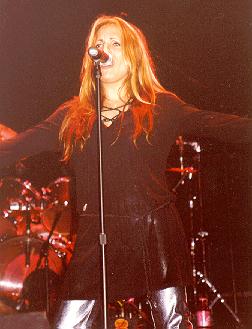 Mariela González Image © R W Elliot 2000 Musical Discoveries |
A melodic and highly symphonic instrumental fills the middle of track. Several distinct themes are passed among the band members, building and blending, and drawing the listener into the developing arrangement. Highly notable in its playing and construction, it is likely the strongest arrangement on the album.
"La Batalla" (The Battle) continues to develop the instrumentals from "Eterno Y Fugaz" balancing keyboard and guitar excursions with orchestral arrangements and more progressive themes including Yes-like guitar and keyboard riffs. Luis' driving percussion moves the track along before themes developed earlier return.
The album reaches its climax in "El Ultimo Ritual" (The Ultimate Ritual) which lyrically appears to revolve around death. Here musical themes developed in the preceding three tracks are re-introduced. Crisp percussion drives a keyboard romp following an intimate vocal passage that begins the song. Lush and rhythmic symphonic keyboard arrangements introduce the concluding theme that with soaring electric guitars and further keyboard excusions revolving around it takes the album to its all-instrumental conclusion.
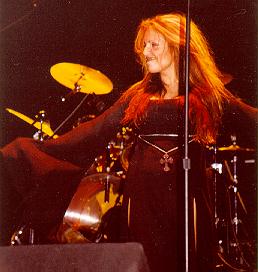 Mariela González Image © R W Elliot 2000 Musical Discoveries |
From Mike Grimes' review in Exposé (Issue 18, November 1999), "While there are nice scattered mezzo vocals by Mariela González, much of the album's 73 minutes is instrumental and primarily features the keyboards. It seems like there should be more vocals actually, as some of the instrumental sections seem to go on too long and the singer has a good voice." More vocals would certainly be appreciated by this reviewer although we believe that the instrumental passages were generally the proper length for a progressive rock album.
We certainly agree with Grimes' concluding comments on the album. It is a solid performance in every respect; technically well recorded, instrumentally rich and vocally superb, this is an album that will appeal to those that like ELP and Yes and those that like progressive music with female vocalists. Grimes wrote, "Overall this is a solid release that neo symphonic / melodic types should enjoy." The compact disc is accompanied by well-produced artwork including an illustrated 12-page booklet with complete lyrics and translation of the title track. The band's next release promises to be most exciting and we certainly can't wait to get our hands on a copy. It is due out in late 2000.
Metanoia. Our editors anxiously awaited the latest 12-track masterwork from Nexus since hearing a preview at NEARfest 2000. Written over a two-year period and recorded the first half of 2001, the project is symphonically orchestral with vast keyboard passages offset by rapidfire or melodic guitar riffs. Mariela's vocals are stunning, often soaring well above the instrumentals; the project is vocally richer than the band's debut and will most certainly appeal to Musical Discoveries' readers.
Musical themes introduced in early stages of the album recur throughout the various tracks as the project develops. Progessively complex, several listens are required for even the most experienced listener to absorb the magestic significance of the project. Sounds from ELP, Yes, Genesis are blended with jazz and traditional rock to delight the listener for the album's 72+ minutes.
Although the album is again sung in Spanish, song names are clearly presented in English as well. Lyrically the album's theme is repentence. Opening with an atmospheric piece called "Eternal Recurrence One," the album closes with an extended version called "Eternal Recurrence Zero." The album's second theme, heavily driven by Lalo Huber's lovely keyboard balanced with Carlos Lucena's melodic electric guitar is introduced in the short "Primal Scream (Metanoia Level 0)." A traditional thickly arranged Nexus-style romp entitled "Metamobo" follows with Mariela's first and extremely powerful vocal performance. Rhythmic percussion, guitar and keyboard solos balance the accessibility of the vocal line.
The music box-style introduction and interludes within to "Wounded Planet" sharply contrast the brief track's driving guitar melody and repeat of one of the album's main themes; symphonic keyboards add to the majesty of the track. The three movement epic "Wake Up Inside A Dream (Metanoia Level 1)" begins with a lovely guitar solo and an anthemic vocal performance by Mariela. Multilayered backing vocals add wonderful texture. Jazz-inspired elements blend with progressive textures during the instrumental movements.
Lalo's classical-style symphonic keyboard passage opens "Towards The Light" as a gentle ballad—with a lovely melody—evocatively sung by Mariela emerges, vocally soaring to the her highest notes on the album. A powerfully lush orchestral arrangement and guitar solos bridge vocal passages and also brings the song to its dramatic closure. "Metanoia (Metanoia Level 2)" builds upon themes developed in the six tracks preceding it with 1970s style keyboards, further classical derivations and driving guitar. The instrumentals are somewhat harder—approaching metal-level in spots.
With the album's power now fully developed, Mariela returns with a powerful and anthemic vocal passage in "The World's Temptation." The harmony lines of the layered backing vocals add a lovely texture joining lush keyboards in the choruses. Carlols Lucena's guitar solos during the instrumental bridges are tremendous.
"In The Hands Of God" is an orchestrally rich 16-minute epic with full-on keyboards and dynamic electric guitar driving the recurrance of the album's instrumental themes. Mariela's powerful lead vocal soars evocatively above carrying the listener across various instrumental solos as tempo, theme and volume excursions characterise the moods of "Desperation," "Resignation," "The Prayer," "The Transmutation" and finally "The Hands Of God."
A short vocal passage entitled "The Message" precedes "The Universal Nexus," a gentle ballad with light guitar a lovely keyboard melody and Mariela's sensually sung vocal passages. The final and ultra-powerful epic effectively summarises the album's themes; Mariela's anthemic vocals soar above Carlos' energetic guitar parts and Lalo's symphonic keyboard passages. The drum and bass rhythmic section—as on the rest of the album that precedes this track—perfectly support this closing epic. Three movements—"The Vortex," "See The Infinity" and "The Revlation"—comprise a completely stunning and dynamic stand-out track.
Simply stated Musical Discoveries' entire editorial staff have been so impressed with Metanoia that well over fifty listens were necessary for our review to do it justice. A tremendous project in every respect, it is clearly one of the top albums the staff have heard in 2001.
Nexus' albums are available at GFT (Surrey, England) and are available from ZNR (Louisville, KY) and from Greg Walker at Synphonic (La Habra, CA). Visit Record Runner (Argentina) for further information. Clearly we have found the band's live performance and albums to be among the best modern progressive albums we've heard. Worth a trans-Atlantic journey, maybe even a trip to Argentina, Nexus' albums and live performances are not only a must listen but also a must see!
Return to website contents